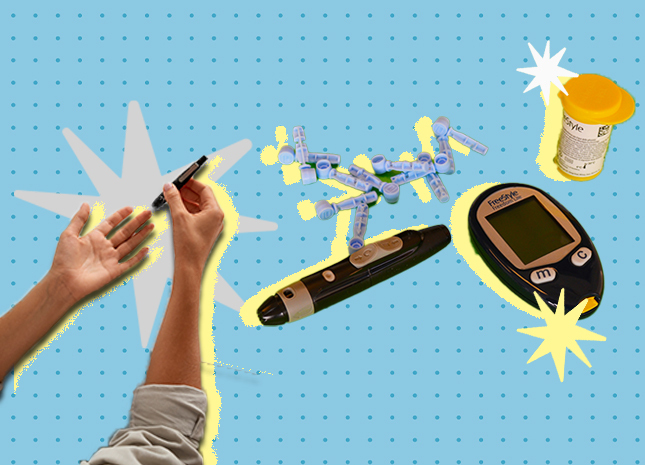
Managing Diabetes: Essential Tips for a Healthy Lifestyle
Diet, exercise, medication, and more.
Diabetes management is crucial for those diagnosed with the condition to live a healthy and fulfilling life. With the right strategies and lifestyle changes, individuals can maintain their blood sugar levels, prevent complications, and enjoy a better quality of life. This article delves into essential tips for managing diabetes effectively, offering practical advice on diet, exercise, medication, and more.
Understanding Diabetes Management
Managing diabetes involves lifestyle changes, monitoring, and medical treatments to keep blood glucose levels within a target range. It includes healthy eating, regular physical activity, taking medications as prescribed, and monitoring blood sugar levels. The goal is to manage blood sugar levels effectively to prevent complications and maintain overall health.
Balanced Diet

A balanced diet is vital for managing diabetes. It helps control blood sugar levels, supports weight management, and provides the nutrients your body needs to function properly. Focus on eating various foods from all food groups, including fruits, vegetables, whole grains, lean proteins, and healthy fats.
Macronutrients

Understanding the role of macronutrients—carbohydrates, proteins, and fats—in blood sugar control is essential. Carbohydrates have the most significant impact on blood sugar levels. Choose complex carbohydrates like whole grains, legumes, and vegetables, which digest more slowly and have a lower glycemic impact. Proteins and fats have a minimal effect on blood sugar but are crucial for overall health.
Portion Control
Portion sizes directly affect blood glucose levels. Eating large portions can lead to spikes in blood sugar. Use tools like measuring cups and food scales to keep portion sizes in check. A good rule of thumb is to fill half your plate with non-starchy vegetables, a quarter with lean protein, and a quarter with whole grains or starchy vegetables.
Meal Planning Tips

Planning meals can help you make healthier choices and avoid last-minute temptations. Incorporate a variety of foods to ensure you get a range of nutrients. Keep healthy snacks, such as nuts, seeds, or cut-up vegetables, to avoid reaching for high-sugar or high-fat options.
Glycemic Index
The glycemic index (GI) ranks foods based on how they affect blood glucose levels. Low-GI foods cause a slower rise in blood sugar and are better choices for diabetes management. Examples include whole grains, legumes, and non-starchy vegetables. Use the GI as a guide to choose foods that will help maintain stable blood sugar levels.
Hydration

Staying hydrated is crucial for overall health and can help control blood sugar levels. Aim to drink plenty of water throughout the day. Avoid sugary drinks like soda and juice, which can cause blood sugar spikes.
Physical Activity

Regular physical activity helps manage diabetes by improving insulin sensitivity and lowering blood sugar levels. It also supports weight management, reduces the risk of cardiovascular disease, and enhances overall well-being.
Incorporate a mix of aerobic, strength training, and flexibility exercises into your routine:
-
Aerobic Exercise: Walking, cycling, swimming, and running help improve cardiovascular health.
-
Strength Training: Exercises like lifting weights or using resistance bands build muscle and improve insulin sensitivity.
-
Flexibility Exercises: Yoga and stretching improve flexibility and reduce stress, which can help manage blood sugar levels.
Exercise can affect blood sugar levels, so monitoring your levels before, during, and after physical activity is essential. This helps you understand how different types of exercise impact your blood sugar and make any necessary adjustments to your routine or medication.
Medication Management

There are various medications available to help manage diabetes, including:
-
Insulin: Essential for people with Type 1 diabetes and some with Type 2.
-
Oral Medications: Such as metformin, which helps control blood sugar levels.
-
Injectable Medications: Other than insulin, like GLP-1 receptor agonists, which help lower blood sugar levels.
Taking medications as prescribed is critical for effective diabetes management. Set reminders, use pill organizers, and develop a routine to ensure you take your medications consistently.
Medications can have side effects. If you experience any adverse effects, discuss them with your healthcare provider. They may adjust your dosage or switch you to a different medication to minimize side effects.
Your medication needs may change due to lifestyle changes, weight loss, or activity levels. Consult your healthcare provider regularly to review and adjust your medications as needed.
You can also buy Wegovy from Canada to manage costs and access medications as part of your diabetes management plan. Be sure to consult your doctor before taking any medication.
Monitoring Blood Sugar Levels

Regularly checking your blood sugar levels helps you understand how your diet, exercise, and medications affect your glucose levels. This information can help you and your healthcare provider make informed decisions about your diabetes management plan.
There are several methods for monitoring blood sugar levels:
-
Glucometers: Portable devices that measure blood sugar from a small blood sample.
-
Continuous Glucose Monitors (CGMs): Devices that provide real-time glucose readings daily and night.
Track your blood sugar levels, medications, diet, and exercise in a logbook or digital app. Share this information with your healthcare provider during appointments to help tailor your treatment plan.
Conclusion
Managing diabetes requires a comprehensive approach that includes healthy eating, regular physical activity, proper medication use, and consistent blood sugar monitoring. By making informed lifestyle choices and staying proactive in your care, you can effectively control your blood sugar levels, prevent complications, and improve your overall well-being.
Diabetes management is a lifelong commitment, but you can lead a healthy, fulfilling life with the right strategies and support. Always consult with your healthcare provider to ensure your management plan is tailored to your specific needs, and stay informed about the latest developments in diabetes care to keep your health on track.











